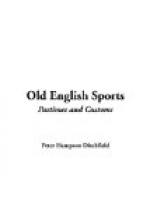In memory of our Lord’s triumphal entry into Jerusalem, when the people took branches of palm-trees and scattered them in the way, on Palm Sunday our ancestors went in procession through the town or village, bearing branches of willow, yew, or box (as there were no palms growing in this country), which were subsequently carried to the church and offered at the altar. This custom lingered on after the Reformation, and until recent times the practice of going a-palming, or gathering branches of willow, on the Saturday before Palm Sunday, has continued. Sometimes in mediaeval times a wooden figure representing our Saviour riding upon an ass was drawn along by the crowds in the procession, and the people scattered their willow branches before the figure as it passed.
Thursday before Easter Day was called Shere, or Maundy, Thursday. The first name is derived from the ancient custom of shering the head and clipping the beard on that day; and Maundy is a corruption of the Latin word mandatum, which means “a command,” and refers to the command of our Lord to imitate His example in the humility which He showed in washing the feet of His disciples. In memory of His lowly act the kings and queens of England used to wash the feet of a large number of poor men and women, and bestowed upon them gifts and money. This practice was continued until the reign of James ii., and in our own day the Queen presents to a certain number of poor people bags of silver pennies, called Maundy money, which is coined for that special purpose.
Many of my readers are familiar with the rhyme concerning “Hot cross buns,” but perhaps they are not acquainted with the superstition which our forefathers attached to them. A writer on Cornish customs says: “In some of our farmhouses the Good Friday cake may be seen hanging to the bacon-rack, slowly but surely diminishing, until the return of the season replaces it by a fresh one. It is of sovereign good in all manner of diseases that may afflict the family, or flocks and herds. I have seen a little of this cake grated into a warm mash for a sick cow.” Hot cross buns were supposed to have great power in preserving friendship. If two friends broke a bun in half exactly at the cross, while standing within the church-doors on Good Friday morning before service, and saying the words—
“Half for you, and half
for me,
Between us two good-will
shall be. Amen,”
then, so long as they kept their halves, no quarrel would arise between them. In the West of England it was considered very sinful to work on Good Friday, and woe betide the luckless housewife who did her washing on that day, for one of the family, it was believed, would surely die before the end of the year. There are many other superstitions attached to the day, such as the preserving of eggs laid on Good Friday, which were supposed to have power to extinguish fire; the making of cramp-rings out of the handles of coffins, which rings were blessed by the King of England as he crept on his knees to the cross, and were supposed to be preservatives against cramp.




